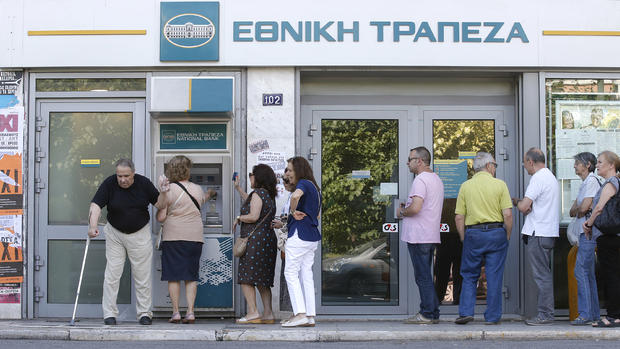Why Greece's bailout agreement could still fall apart
Stocks have been on a roll so far this week in the wake of the eleventh-hour deal between Greece and its European creditors early Monday. The Dow Jones industrial average on Tuesday climbed back above the 18,000 level first crossed back in December.
The enthusiasm follows three weeks of brinkmanship between Athens and its creditors, which includes other eurozone members, the European Central Bank and International Monetary Fund. The "pre-deal" -- since so many details remain unresolved -- amounts to a full surrender by Athens just one week after its people voted against more austerity in a surprise referendum.
In exchange for merely considering a new bailout package worth about $100 billion (this is the third deal since the Greek debt crisis started in late 2009) and vague assurances that debt relief will be considered in the years to come, Greece must submit and pass a long list of measures by Wednesday. That includes, to the shock of many Greeks, a fund set up to hold $55 billion in public assets that creditors can privatize as financing needs dictate.
In other words, Greece is getting a visit from the repo man.
Such a dose of austerity may be too strong not only for Greeks, but for the IMF. The international lender is threatening to unravel the agreement by demanding large upfront debt relief measures for Greece to help it escape its debt-deflation nightmare.
"The dramatic deterioration in debt sustainability points to the need for debt relief on a scale that would need to go well beyond what has been under consideration to date -- and what has been proposed by the ESM," the IMF said in reference to the so-called European Stability Mechanism bailout fund.
These demands have been made before, notably in a previous debt analysis report released earlier this month and cited by Greek leaders during negotiations. The crux of the problem is that Greece cannot work its way out of indebtedness -- let alone an additional $100 billion under the last bailout -- as austerity measures dampen economic growth amid a six-year-old depression and a 50 percent youth unemployment rate.
In the IMF's estimation, measures such as a 30-year moratorium on debt payments, large upfront debt forgiveness and a lengthening of debt maturities are needed to get Greece back on its feet. At the start of the crisis, Greece's debt-to-GDP ratio stood at 127 percent. Now, the IMF believes debt will peak at close to 200 percent in the next two years, compared with a prior forecast of 177 percent.
What's different this time is that the IMF has increased its estimates of the amount debt relief Greece needs. Now, it's accounting for the economic damage that's been suffered since Greece's banks were forced to close two weeks ago after the European Central Bank froze the funding it provides.
Here's the stinger: According to the Financial Times, the IMF is threatening to walk away from the deal and not provide financing should Greece's eurozone creditors ignore its findings. German hardliners have made any new rescue program for Greece conditional on the IMF's participation and have been resistant to the idea of debt relief for fear anti-euro parties on the rise in Spain and Italy will demand similar help.
Before the IMF news broke, Wall Street analysts were already pooh-poohing the deal.
Goldman Sachs (GS), while noting the pre-deal announcement is a positive surprise in the near term, they have two main concerns. The first is residual implementation risks as politicians on both sides get their say. The second is that the prescription for Greece's woes amounts to more of the same -- fiscal austerity and debt deflation -- and will continue to reveal the structural flaws of the eurozone.
Deutsche Bank believes Greece is headed for a new election in September in which the political battle will not be over who is for or against austerity, but rather who is for or against a return to the drachma and an exit from the eurozone.
Bank of America Merrill Lynch analysts warn that German leaders are now willing to let the risk of being forced out of the eurozone as a standing threat against countries that don't follow creditors' orders on austerity. That could stir even more vehement anti-euro parties within Greece, the financial firm says.
The upshot: Greece is far from fixed despite the ebullience of the U.S. stock market over the past 48 hours.
